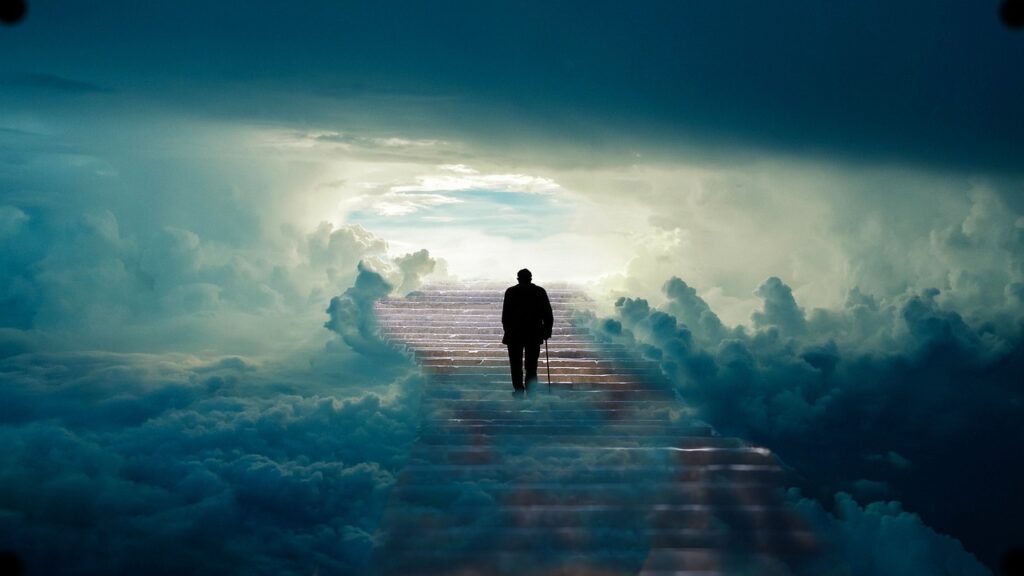My guess is that someday when I arrive in heaven, I’ll find out that I’m there because I killed myself.
- Perhaps I will discover I died by my own poor judgment, not looking both ways before walking out into an intersection.
- Or perhaps I’ll find that I should have paid attention to that noisy wheel bearing, which made my front wheel fall off, which made me lose control on the highway, which caused my fatal head-on collision with the semi.
- Maybe I’ll learn my death was caused by the Roundup I sprayed upwind on that one blustery day, which entered my lungs and started the cancer that would kill me.
- Perhaps I will have died from keeping my cell phone too close to my bed at night, slowly frying my brain cells.
- Maybe my undoing will have been caused by the taurine (whatever that is) in my Rockstar energy drink. Come to think of it, there are a lot of things I ingest without a clue about what they are–any one of them could have been my undoing.
- Maybe it will have been due to the butter I used to eat, then the margarine I replaced it with, then the butter I went back to.
- Perhaps the thing that will have killed me is some adventurous thing I ate overseas: the silkworms, the cow udders, the goose intestines, the 1000-year-old egg. None of those had nutrition labels, which I would have likely disregarded anyway.
- Perhaps, in my obsession with fitness, I’ll learn that I ran a few too many miles per week, which actually weakened my heart instead of strengthening it.
- Possibly I’ll learn my demise was caused by one of the many vaccines I took in my lifetime, not knowing much (or caring much, quite frankly) about any of their long-term effects.
- Maybe I’ll find I died from a currently-unknown long-term side-effect of the Covid virus that I wasn’t careful to avoid contracting.
- Perhaps it’ll be revealed that I died because I believed and followed the wrong medical advice from those who I thought seemed credible at the time.
Of course, it’s entirely possible I’ll end up in heaven due to no fault of my own: I was murdered by a robber, hit by a drunk driver, or killed by a tornado. But if I had to bet, I’ll bet it’s more likely that I will have contributed to my own death. And I’m actually ok with that.
Why am I reflecting on all of this?
Because many people today seem consumed with doing everything possible to not kill themselves. They seem bent on eliminating all health risks, trying to live as long as humanly possible. This would be an understandable and appropriate view for those who do not believe in the afterlife. After all, if this life is all there is, then maximizing one’s number of days makes total sense. Eat, drink, and be merry for tomorrow we die. Now there’s a consistent worldview!
But the Christian belief that we are currently living in The Shadowlands–as C.S. Lewis phrased it–and that paradise is our eternal destination means we mustn’t put an inordinate amount of focus on health, life preservation, and life extension.
Am I saying we should throw caution to the wind and live reckless lives? Not necessarily. But I am saying that those of us who hope in the afterlife should only take reasonable safety precautions–not absolute safety precautions. We could spend our entire life fearfully consumed with avoiding every health risk, making safe choices, and joylessly striving to prolong our days, all the while potentially missing what we’re actually here for. That would be an inconsistent worldview!
Christians like me who are convinced that heaven will be a far better place than earth should spend more energy dreaming of that life rather than holding-on-for-dear-life to this one. The Apostle Paul said it well, “If I am to go on living in the body, this will mean fruitful labor for me. Yet what shall I choose? I do not know! I am torn between the two: I desire to depart and be with Christ, which is better by far (Philippians 1:22-23). Paul wasn’t suicidal, but he kept a proper perspective on life and death. For the believer, death is a promotion, not the end.
This eternal perspective allows us to worry little about life extension. In fact, it goes the other way and even enables us to become risk-takers since the self-preservation of our mortal bodies is no longer our ultimate goal. I have history on my side here; we see the Christians’ disregard for health and safety throughout church history. Look at the physical sufferings of the apostles. Look at generations of martyrs who chose to surrender their bodies to death rather than recant their faith. Do we accuse them of self-harm or commend them for their strong faith? Faith.
Consider the physically reckless way the early church cared for those with communicable diseases. This morning I was reading how the early Christians in Carthage responded to the great plague of 251 AD. “Cyprian urged them to nurse sick people and touch them. He reminded them that they could act in this mortally dangerous way because their faith in Christ, which gave them hope for everlasting life, had healed their fear of death.” [The Patient Ferment of the Early Church, 2016, by Andrew Kreieder, p. 111].
Someday I may learn that I killed myself. It will likely have been due to ignorance, inattentiveness, or personal failure. Oops. Nevertheless, what I really hope to discover on that day is that my brief earthly life was characterized more by “fruitful labor” than life extension.
For part 2 on this topic, click HERE
_________________________________________________________________________________________________
Subscribe to my blog to receive notifications when I post. (I may not always post them on Facebook in the future).
[subscribe2]

Leave a Reply